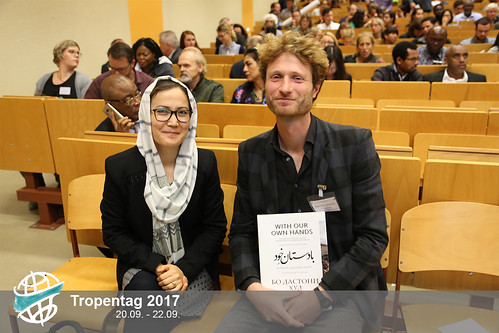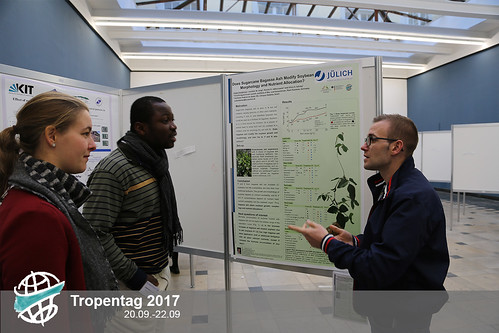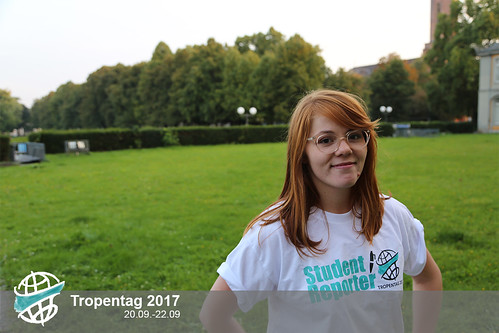schumacherlydia's blog
Moving Pictures
Fri, 09/22/2017 - 13:04 — schumacherlydiaInstead of presenting another powerpoint, Frederik van Oudenhoven impressed the audience with his moving pictures - a movie about the villages of the Pamir Mountains in Afghanistan and Tajikistan. This vivid movie not only touched me, but the majority of the audience, measured by the loud and lasting applause afterwards.

The Dutch film maker and biologist has devoted the last few years to understanding, preserving and publishing the traditional knowledge of people living in the isolated villages around the Afghan-Tajikistan border. Instead of focusing on the numbers of unemployed, undernourished and illiterate, he turned the camera to not only stunning landscapes but agricultural production, food processing, food culture and the people behind each stage. Further, he emphasized the beauty of diversity, whether it was biodiversity or cultural diversity. His film suggest with the loss of diversity we also lose beauty.
Terraces, Tenure and Tea
Thu, 09/21/2017 - 10:28 — schumacherlydiaAfter the interesting and inspiring first day at Tropentag 2017, people dragged themselves out of their beds to the AULA at the University of Bonn for today's morning poster session about land use and land use changes. Andreas Brueckert, head of the department of Organic Plant Production at the University of Kassel, guided us charmingly through the jungle of posters. Personal eye- and ear-catchers for me were the presentations on how the future of tea in Malawi depends on the changing climate, tenure influences land conservation, and sustainable land management works in the fragile political context of Northern Afghanistan.
As the presenter did not show up, Andreas, who was well-prepared quickly took over and concisely explained the study. He spiced it up with facts he already knew from his own research, like one major obstacle for planting trees in the socio-ecological context is the change in ownership. The one who plants the tree automatically owns it. Therefore, land tenure hinders the implementation of land conservation methods, slowing afforestation in communal land.
Christian, demonstrated another threat, not to trees but to tea. During an intensive modelling study he and his colleagues investigated the impact of climate change to tea production in Malawi. Whereas just few areas can sustain their production with incremental adaptation, large areas are at risk. As tea is an important crop for agriculture in Malawi, this outcome poses a big challenge for both farmers and researchers, as resilient varieties are needed.
Soil Matter(s) - More Attention Please!
Wed, 09/20/2017 - 19:42 — schumacherlydiaIn the AULA, the poster session started with only a handful of patient Tropentag participants as the plenary session dragged on without end. After a few posters were presented, it got more and more crowded, to the point that standing two meters away from the speaker made it impossible to hear, much less understand. Conversations among the gaggle watching made it even harder. Camera and t-shirt made it clear I was there on business, and people made way so I could capture the the main content.

Based on the presented posters during the first session, soil and its components (it's a 4-dimensional object!) play a vital role in sustainable food production and therefore our future. The young researchers tried to find ways to use the many qualities of soil. Vitalij from the Juelich Institute had researched the effects of recycling sugarcane bagasse, a byproduct of industrial processing, when applied in soybean cultivation to increase nutrient availability and uptake.
Meg: Cheers, Prost, Vô
Wed, 09/20/2017 - 10:11 — schumacherlydiaDreams, visions and the will to take action brought Megan from the United States to the University of Helsinki and even further to Bonn, thanks to an a invitation from her Agroecology department. She hopes to contribute this year to the output of the Student Reporter Team through articles, pictures and film. Before coming to Bonn, Meg, how she prefers to be called, spent the last year generating scientific texts. At Tropentag, she is looking forward to reaching the general public by posts and pictures digestible for everyone, not just super scientists.
One advantage she sees in working in an international team like ours, is learning how to say cheers in new languages, meeting people in her discipline, and learning how to best communicate science. Meg's first impression of Germany were the cool and comfortable chairs at the airport in Munich. She had a five hour layover, and enjoyed good German coffee after years of dark tar, known as Finnish coffee. Strong and energetic, she is ready to further develop her journalistic skills. She hopes to enrich her understanding of sustainable food system transformation. And who knows? Maybe she will also have the chance to talk about her personal passions, collecting mushrooms and ice fishing.





